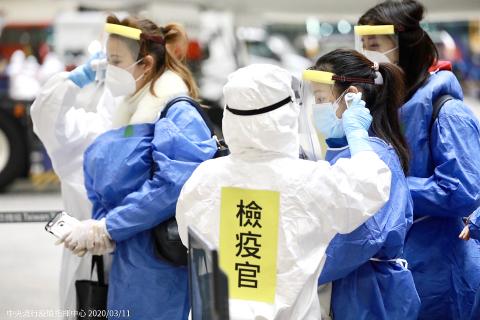A China Airlines (中華航空) charter flight to evacuate Taiwanese stranded in China on Tuesday was delayed by Chinese authorities, who unilaterally attempted to make last-minute changes to the passenger manifest, an anonymous source said yesterday.
Just before the flight was scheduled to depart Hubei Province at 5pm, Chinese authorities attempted to add 30 passengers not on the original manifest, saying that there was “enough room in the cabin,” the source said.
They also refused to let passengers don protective clothing, saying it was “unnecessary,” the source said.

Photo courtesy of the Central Epidemic Command Center
The two maneuvers caused the flight to be delayed until 9:46pm, as the Central Epidemic Command Center and other medical authorities in Taiwan refused to accept the moves, creating a four-hour stalemate, until the passengers were allowed to don protective clothing and board the aircraft, the source added.
A separate charter flight operated by China Eastern Airlines (中國東方航空) was also delayed and arrived in Taiwan at 4:08am yesterday.
Although the Chinese authorities had claimed that protective clothing was unnecessary, the China Eastern Airlines flight crew all wore protective gear, the source said, citing a Taiwanese passenger on the flight.
Despite the delays caused by the Chinese authorities not respecting Taiwan’s health and quarantine regulations, Xinhua news agency yesterday reported that the Taiwanese government was “obstructing Taiwanese from returning home,” the source said.
A Hubei official in charge of Taiwan-related issues also lambasted Taipei for not allowing the 30 additional passengers to board either flight, the source said.
The Hubei Provincial Government’s Taiwan Affairs Office said in a statement that the Taiwanese government had rejected its suggestion that 30 people on a waiting list be allowed to fill vacant seats.
Asked about the statement, Minister of Health and Welfare Chen Shih-chung (陳時中) said: “It is very important that we get the passenger list beforehand so that we can make arrangements for their isolation and quarantine, and to monitor their health, as well as settling them in quarantine centers after they return to Taiwan.”
“We did not feel safe transporting passengers who were suddenly put on the list, so we refused to let them board the airplane,” said Chen, who heads the Central Epidemic Command Center.
Meanwhile, Chinese Nationalist Party (KMT) Chairman Johnny Chiang (江啟臣) said that politics should neither obstruct the return of Taiwanese nor “cause a hole” in epidemic prevention efforts.
“If governments squabble at a time like this, it is only common people who get hurt. Diseases knows no borders — I hope that both sides can put aside politics and communicate effectively,” he said.
“Health knows no borders. Taking good care of the nation’s citizens is the government’s most important task,” President Tsai Ing-wen (蔡英文) later wrote on Facebook, adding that there were “no political considerations” involved in the officials’ rejection of additional passengers who were not on the charter flights’ original manifests.
Additional reporting by Lee I-chia and CNA

Seventy percent of middle and elementary schools now conduct English classes entirely in English, the Ministry of Education said, as it encourages schools nationwide to adopt this practice Minister of Education (MOE) Cheng Ying-yao (鄭英耀) is scheduled to present a report on the government’s bilingual education policy to the Legislative Yuan’s Education and Culture Committee today. The report would outline strategies aimed at expanding access to education, reducing regional disparities and improving talent cultivation. Implementation of bilingual education policies has varied across local governments, occasionally drawing public criticism. For example, some schools have required teachers of non-English subjects to pass English proficiency

‘FORM OF PROTEST’: The German Institute Taipei said it was ‘shocked’ to see Nazi symbolism used in connection with political aims as it condemned the incident Sung Chien-liang (宋建樑), who led efforts to recall Democratic Progressive Party (DPP) Legislator Lee Kun-cheng (李坤城), was released on bail of NT$80,000 yesterday amid an outcry over a Nazi armband he wore to questioning the night before. Sung arrived at the New Taipei City District Prosecutors’ Office for questioning in a recall petition forgery case on Tuesday night wearing a red armband bearing a swastika, carrying a copy of Adolf Hitler’s Mein Kampf and giving a Nazi salute. Sung left the building at 1:15am without the armband and apparently covering the book with a coat. This is a serious international scandal and Chinese

TRADE: The premier pledged safeguards on ‘Made in Taiwan’ labeling, anti-dumping measures and stricter export controls to strengthen its position in trade talks Products labeled “made in Taiwan” must be genuinely made in Taiwan, Premier Cho Jung-tai (卓榮泰) said yesterday, vowing to enforce strict safeguards against “origin laundering” and initiate anti-dumping investigations to prevent China dumping its products in Taiwan. Cho made the remarks in a discussion session with representatives from industries in Kaohsiung. In response to the US government’s recent announcement of “reciprocal” tariffs on its trading partners, President William Lai (賴清德) and Cho last week began a series of consultations with industry leaders nationwide to gather feedback and address concerns. Taiwanese and US officials held a videoconference on Friday evening to discuss the

PERSONAL DATA: The implicated KMT members allegedly compiled their petitions by copying names from party lists without the consent of the people concerned Judicial authorities searched six locations yesterday and questioned six people, including one elderly Chinese Nationalist Party (KMT) member and five KMT Youth League associates, about alleged signature forgery and fraud relating to their recall efforts against two Democratic Progressive Party (DPP) legislators. After launching a probe into alleged signature forgery and related fraud in the KMT’s recall effort, prosecutors received a number of complaints, including about one petition that had 1,748 signatures of voters whose family members said they had already passed away, and also voters who said they did not approve the use of their name, Taipei Deputy Chief Prosecutor